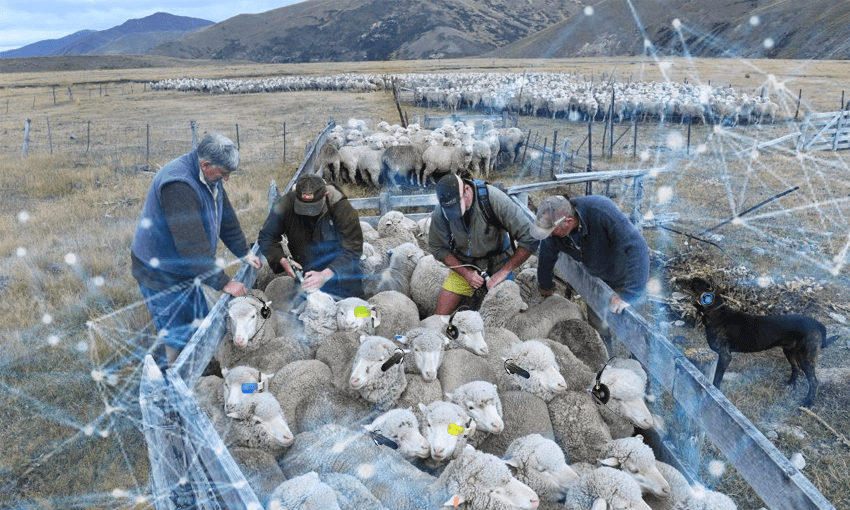Otago-grown agricultural technology company Techion has cornered an international market. Its founder, Greg Mirams, explained how the internet of things and fast fibre broadband has transformed the way he does business.
In a Dunedin bedroom in 1992, Greg Mirams invented Techion’s founding product: FEKPAKG2. It was developed to help local farmers test the effectiveness of their drenching processes, a technique farmers and vets use to control parasites in animals. It’s an integral part of New Zealand’s agricultural industry, and since 1992 Techion has been changing the way drenching is done.
Before Mirams’ invention, parasite control ran on hunches. Now, it’s based on evidence. The technology allows users to take a photograph of a sample and have it analysed for parasites in real-time. It’s gone from a single product to a full-blown information company, delivering multiple, easy-to-use solutions to disease problems that can be complicated.
Today, the global-standard diagnostics company is well-placed inside the internet of things. Its smart devices use the internet to analyse samples and provide clients with live access to professionals around the world. “Our system allows for real-time analysis of samples,” says Miram of the constantly-developing technology. “It’s now beginning to encompass machine learning and AI.”
Did he see this future for the company when he first started it in his Dunedin home? “In all honesty, no,” he said. “In 1992 mobile phones were only starting to become more widely used and the digital revolution created by the internet and wifi was only beginning.”
Techion has been staffed by smart folk since the outset, so as soon as they realised the advantages good connectivity could bring, the future was clear. “Not only has it enabled us to automate the technology,” said Mirams about a good internet connection, “it has allowed us to apply our methodology developed on farm animals to diagnose and control parasites in humans”.
That’s huge. The company is currently working with the World Health Organization to help eliminate parasitic worm infections in people around the globe. This is a testament to Mirams’ desire to help farmers, vets, and doctors at every level. The first generation of FECPAKG2 was used manually by Otago farmers.
“Farmers were worried about how they would cope using a scientific instrument like a microscope,” said Mirams. “We knew we had to move to a more automated system where farmers and users without knowledge of parasitology or science could rely on a network of professionals across the world to provide them quickly with accurate data.”
That’s when the team knew internet connectivity would be integral to the company’s business. “With broad coverage of higher speed internet quickly growing, it has meant that the delivery of a more automated, easy and effective system became achievable,” said Mirams. “Internet and technology have revolutionised Techion.”
These technological advances have moulded Technion’s product, but it’s also responsible for keeping its users connected. From the company’s base in Invermay, it’s able to train clients as far abroad as Ethiopia and Laos. This means the fast and reliable broadband that a fibre connection offers could enable VOIP when a client is far away is essential.
“We use video conferencing and webinars to train our clients in the comfort of their own farm, home or office,” said Mirams. “We pride ourselves on having personal relationships with our clients and so regularly answer questions and share information on the phone.”
Mirams is currently concluding a visit to the US, where he’s speaking in person to investors as well as hosting a webinar for the Food and Drug Administration about Techion’s work. This is just one example of the applications a globalised technology company can have.
Another comes from Techion’s partnership with UK supermarket chain Sainsbury’s. The globally-recognised brand saw that Techion’s ability to detect drench resistance could save the brand’s lamb suppliers up to NZ$19 million each year. It funded a three-year project operating out of farms in the UK and New Zealand, brought together by smart technology and quality connectivity.
Invermay might be a few kilometres from Techion’s birthplace in the suburb of Roslyn, but thanks to fast fibre broadband it’s never more than a video chat away from anyone who needs it.
Although the company and Mirams can be found broadcasting from every corner of the globe, its home base is still tucked just behind Mosgiel, in one of New Zealand’s largest Crown Research Institutes. Geographically, Techion is never far from the Otago farms that inspired the technology. Thanks to smart technology and more widespread fibre connections, it’s never far from any farm in the world.
This content was created in paid partnership with Chorus. Learn more about our partnerships here.


